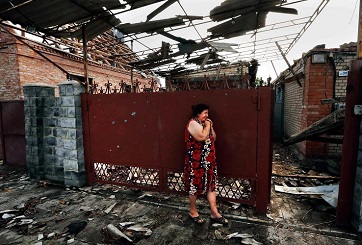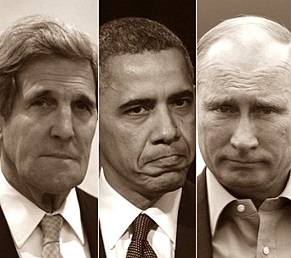War is Our Business and Business Looks Good

A woman surveyed the damage near Slovyansk, in eastern Ukraine,
on Tuesday after recent mortar attacks in the region. (Y. Behrakis)
It is enlightening to see how pugnacious the U.S. establishment, led by the Peace Laureate, has been in dealing with the Ukraine crisis. The crisis arguably began when the Yanukovich government rejected an EU bailout program in favor of one offered by Russia. The mainstream media (MSM) have virtually suppressed the fact that the EU proposal was not only less generous than the one offered by Russia, but that whereas the Russian plan did not preclude further Ukrainian deals with the EU the EU plan would have required a cut-off of further Russian arrangements. And whereas the Russian deal had no military clauses, that of the EU required that Ukraine affiliate with NATO. Insofar as the MSM dealt with this set of offers they not only suppressed the exclusionary and militarized character of the EU offer, they tended to view the Russian deal as an improper use of economic leverage, “bludgeoning,” but the EU proposal was “constructive and reasonable” (Ed., NYT, Nov. 20, 2014). Double standards seem to be fully internalized within the U.S. establishment.
The protests that ensued in Ukraine were surely based in part on real grievances against a corrupt government, but they were also pushed along by rightwing groups and by U.S. and allied encouragement and support that increasingly had an anti-Russian and pro-accelerated-regime-change flavor.
They also increased in level of violence. The sniper killings of police and protesters in Maidan on February 21, 2014 brought the crisis to a new head. This violence overlapped with and eventually terminated a negotiated settlement of the struggle brokered by EU members that would have ended the violence, created an interim government and required elections by December. The accelerated violence ended this transitional plan, which was replaced by a coup takeover, along with the forced flight of Victor Yanukovich.


























